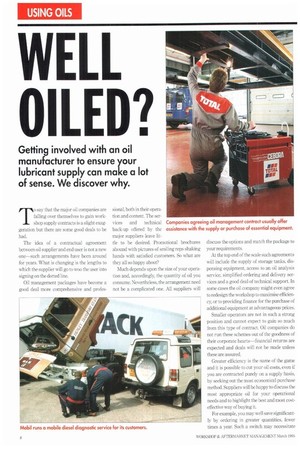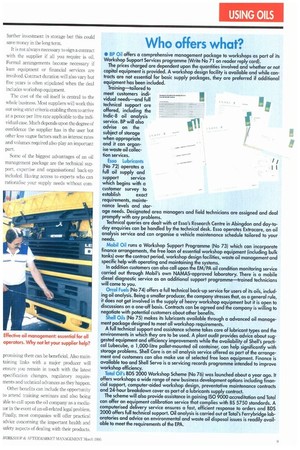WELL LED?
Page 98

Page 99

If you've noticed an error in this article please click here to report it so we can fix it.
Getting involved with an oil manufacturer to ensure your lubricant supply can make a lot of sense. We discover why.
T„ say that the major oil companies are falling over themselves to gain workshop supply contracts is a slight exaggeration but there are sonic good deals to be had.
The idea of a contractual agreement between oil supplier and end user is not a new one—such arrangements have been around for years. What is changing is the lengths to which the supplier will go to woo the user into signing on the dotted line.
Oil management packages have become a good deal more comprehensive and profes sional, both in their operation and content. The services and technical back-up offered by the major suppliers leave little to be desired. Promotional brochures abound with pictures of smiling reps shaking hands with satisfied customers. So what are they all so happy about?
Much depends upon the size of your operation and, accordingly, the quantity of oil you consume. Nevertheless, the arrangement need not be a complicated one. All suppliers will discuss the options and match the package to your requirements.
At the top end of the scale such agreements will include the supply of storage tanks, dispensing equipment, access to an oil analysis service, simplified ordering and delivery services and a good deal of technical support. In some cases the oil company might even agree to redesign the workshop to maximise efficien• cy, or to providing finance for the purchase of additional equipment at advantageous prices.
Smaller operators are not in such a strong position and cannot expect to wain so much from this type of contract. Oil companies do not run these schemes out of the goodness of their corporate hearts—financial returns are expected and deals will not be made unless these are assured.
Greater efficiency is the name of the game and it is possible to cut your oil costs, even if you are contracted purely on a supply basis, by seeking out the most economical purchase method. Suppliers will be happy to discuss the most appropriate oil for your operational needs and to highlight the best and most costeffective way of buying it.
For example, you may well save significantly by ordering in greater quantities, fewer times a year. Such a switch may necessitate further investment in storage but this could save money in the long term.
It is not always necessary to sign a contract with the supplier if all you require is oil. Formal arrangements become necessary if loan equipment or financial services art. involved. Contract duration will also vary but five years is often stipulated when the deal includes workshop equipment.
The cost of the oil itself is central to the whole business. Most suppliers will work this out using strict criteria enabling them to arrive at a pence per litre rate applicable to the individual case. Much depends upon the degree of confidence the supplier has in the user but other less vague factors such as interest rates and volumes required also play an important part.
Sonic of the biggest advantages of an oil management package are the technical support, expertise and organisational back-up included. I laving access to experts who can rationalise your supply needs without corn promising them can be beneficial. Also maintaining links with a major producer will ensure you remain in touch with the latest specification changes, regulatory requirements and technical advances as they happen.
Other benefits can include the opportunity to attend training seminars and also being able to call upon the oil company as a mediator in the event of an oil-related legal problem. Finally, most companies will offer practical advice concerning the important health and iafety aspects of dealing with their products.




















































































































